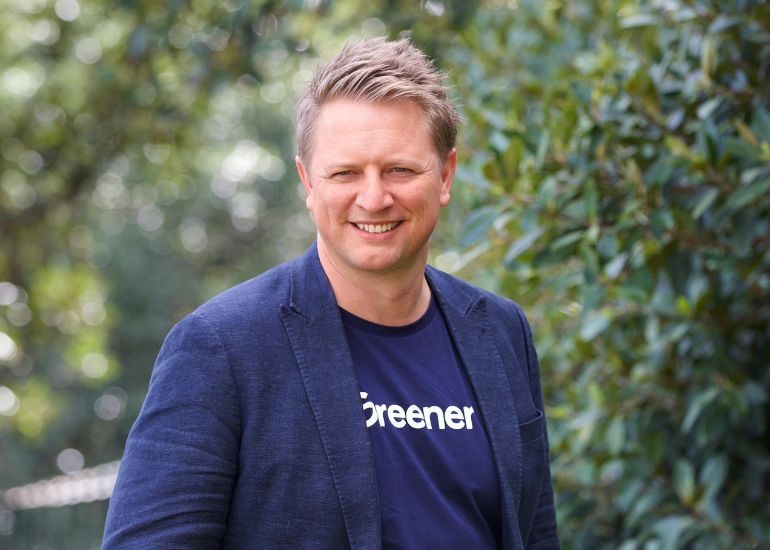[ad_1]
What if the biggest problem with “greenwashing” isn’t just that it exists, but that it has led to a new problem that could be even more harmful to the climate crisis? Tom Ferrier from Greener for Business explains.
Greenwash, like a COVID virus, has somehow morphed into a whole new variant that is breeding fear and uncertainty. Enter “greenhush”, greenwash’s partner in climate crime.
And it’s this diabolical duo and the fear they invoke that is insidiously blocking our progress against climate change at every turn.
When the fear of doing the wrong thing means people and businesses ultimately do nothing, action on climate change slows down.
Controversial? Maybe. Let’s unpack it.
What is “greenwashing” and what’s not?
Most people have heard of the term “greenwashing” but the blurriness begins when you ask people what this actually means.
Greenwash is about being deceptive. It’s deliberately making false or misleading, unsubstantiated statements about the environmental benefits of a product or practice – using these smoke and mirror tactics to garner undeserved goodwill.
But the big misconception playing out in every corner of the climate conversation seems to be centred around a common theme: unless you’re tackling climate change perfectly on every front, that must mean you’re “greenwashing”. Right?
Well, here’s the first kink we need to iron out immediately.
Clamping down on greenwashing can hold people and businesses accountable for the claims they make about their sustainable initiatives. And this accountability is very important. The climate clock is ticking and there’s simply no time for cheats or liars when it comes to green claims. Cutting corners, all talk and no action, will get us nowhere.
The problem, however, is that between the rapidly changing regulatory landscape and endless climate debate, many have lost sight of what greenwash is about – and what it’s not about.
Greenwash is NOT the failure to do everything perfectly.
If you’re out there deliberately making unsubstantiated claims, exaggerating the environmental impact you’re having, make no mistake, you’re greenwashing. And let me be clear, there is absolutely no place for “greenwash” when it comes to solving the climate crisis.
But what we need to be even clearer about is that making an effort, big or small, and talking openly and honestly about how these steps are helping to meaningfully reduce your environmental impact is NOT greenwashing.
And here we get to the crux of the issue.
It’s right about here that the fear factor kicks in: fear of getting it wrong, of actions being too small to count, of not being “green enough”.
It’s where greenhush rears its ugly head, stifling progress, relegating climate conversations to the shadows.
Is “greenhushing” the same as “greenwashing”?
Greenhushing is when people or businesses deliberately downplay or don’t talk about their accomplishments when it comes to sustainability, for fear of judgement or negative consequences.
And according to current trends, staying silent on sustainability (aka greenhushing) can be a form of greenwashing.
Some believe there are bad eggs out there who haven’t actually taken the right steps and are deliberately staying quiet to avoid scrutiny – using greenhushing as a tactic to deceive. And as you’ll remember from earlier, greenwashing is when people or businesses deliberately make false or misleading (deceptive) statements about environmental initiatives.
They want to pretend they’re doing all the right things, but blame the stigma of greenwashing for why they can’t talk about it.
How does this happen? Well, company reporting on sustainability is currently voluntary. Which means some businesses may make assertions about their progress, without having to prove their claims (a “fake it until they make it” approach).
How is greenhushing part of the problem then?
As the saying goes, there’s always two sides to every story.
For the majority of businesses starting their journey (and yes, most are genuinely trying to do the right thing), they’re scared their efforts won’t be seen as “green enough”, being (green)hushed into silence.
It’s great that there are businesses out there making massive strides towards net zero and inspiring others to follow their example. Celebrated brands like Patagonia, Kathmandu, Schneider Electric are all held up as the poster children for action on climate change and for good reason. If only there were more businesses like them.
But becoming a B Corp or carbon neutral organisation doesn’t just happen overnight.
We all have to start somewhere. And so there are other businesses, making much smaller (yet equally meaningful) strides, to help address the climate crisis; but, for fear of judgement, they don’t publicise their achievements.
They stay silent.
Just because the effort is small, doesn’t mean that the impact isn’t meaningful.
Whether it be judgement by regulators, the media, partners or customers, the perceived risk of negative attention outweighs the positive impact talking about their actions could inspire in others.
So here we are, in a vicious cycle where a lack of publicised action feeds inaction.
So what’s the solution?
As you can see, it’s complicated.
But that’s the whole point. We need to make it easier. Because the more complicated things get, the less likely people are to take action. We need to make space to be open and honest, and feel good about genuine effort, without fear of judgement.
In the business world, judgement and scrutiny that results in negative consequences can have serious ramifications for customer acquisition, loyalty, competition, market share, branding, revenue, share prices and so much more.
The climate crisis won’t be solved by a handful of big businesses doing climate action perfectly. We need every business, big and small, to take action – and this action may be imperfect at first, but no one gets to net zero overnight.
And the status quo of leading with the stick, leading with the threat of punishment, isn’t working. So why not try some carrots?
Don’t let ‘perfect’ be the enemy of ‘good’
This isn’t about giving a free pass to businesses to deliberately do the wrong thing.
This is about making it safe to celebrate the small steps at every stage of the journey – so no one is hushed into inaction.
As every good business strategist, growth hacker, educator, elite athlete or behavioural scientist will tell you, future success is about the freedom to fail upwards; to test and learn, to share knowledge and about positive reinforcement to keep getting better.
So if I can leave you with one key take away, it’s this: All talk and no action will get us nowhere. But no talk, no action is an even bigger threat.
The only thing worse than making a mistake or two along the way is being too scared to start at all.
If you’re interested in being part of the climate solution, and keen to discover simple ways to save money and the planet at the same time get in touch today at greener.com.au/business.
Tom Ferrier is the CEO and founder of Greener for Business, a new Australian platform providing simple solutions that helps businesses save money and go greener.
Join Tom and Kochie’s Business Builders for a FREE online masterclass to find out how you can too:
Small Business Guide To: Going Greener For People, Planet and Profit
[ad_2]
Source link



